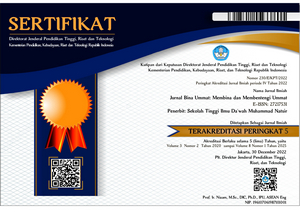THE CONCEPT OF AL HISBAH AND ITS IMPLEMENTATION IN INDONESIA IN THE PERSPECTIVE OF DA'WAH
DOI:
https://doi.org/10.38214/jurnaldawahstidnatsir.v6i1.182Keywords:
al hisbah, preaching, nahi munkar, rules, implementationAbstract
Da'wah activities through efforts to prevent evil ( nahi munkar ) among humans are known as al-Hisbah . The practice of munkar occurs everywhere and is carried out openly. This requires maximum prevention efforts from various parties. Both from the side of the state and also from society. However, the facts on the ground show that the implementation of the al munkar causes many problems (madharat). This study used a qualitative research method with a library research approach, also called a qualitative literature review. The author conducts an in-depth (philosophical) study to find principles in the application of hisbah that originate from the books of the Salaf and Khalaf scholars. The conclusion from the results of this study states three things: First, the concept of hisbah in Islam is comprehensive. This concept does not only speak of monitoring one area but all things, which includes the goodness left behind and the evil that is seen, with its four pillars: al muhtasib, al muhtasab 'alaihi, al muhtasab fihi, and al ihtisab. Second, the authors have formulated 14 important rules that become guidelines in the practice of hisbah across the state. Third, the author has also formulated 17 important principles in the practice of hisbah in society.
Published
Versions
- 2023-08-30 (2)
- 2023-06-29 ()
How to Cite
Issue
Section

This work is licensed under a Creative Commons Attribution 4.0 International License.
This work is licensed under a Lisensi Creative Commons Atribusi 4.0 Internasional.
Authors who publish with this journal agree to the following terms:
- Authors retain copyright and grant the journal right of first publication with the work simultaneously licensed under a Creative Commons Attribution License that allows others to share the work with an acknowledgment of the work's authorship and initial publication in this journal.
- Authors are able to enter into separate, additional contractual arrangements for the non-exclusive distribution of the journal's published version of the work (e.g., post it to an institutional repository or publish it in a book), with an acknowledgment of its initial publication in this journal.
- Authors are permitted and encouraged to post their work online (e.g., in institutional repositories or on their website) prior to and during the submission process, as it can lead to productive exchanges, as well as earlier and greater citation of published work (See The Effect of Open Access).




